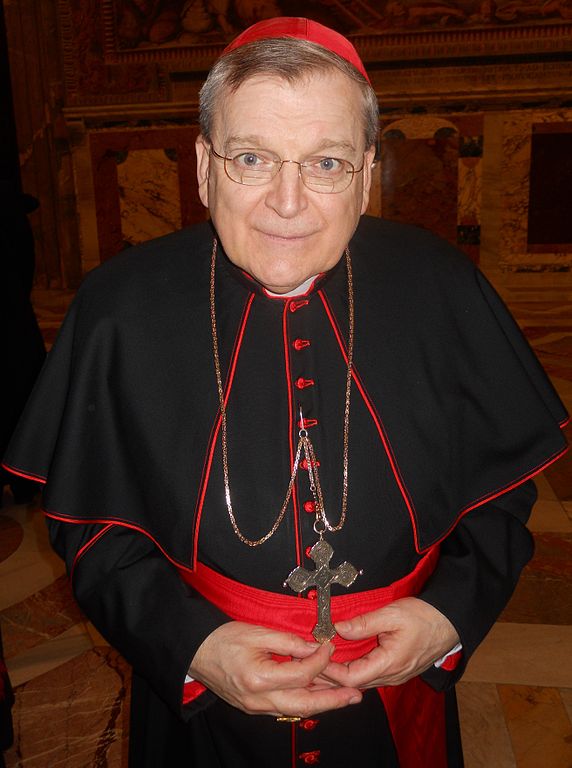. . . including by high-ranking cardinals.

Raymond Leo Cardinal Burke (2-22-14) [Wikimedia Commons / Creative Commons Attribution-Share Alike 3.0 Unported license]
*****
So why are Cardinal Burke and three other retired cardinals asking for it again? I have massively documented the repeated clarifications and defenses of this papal document, in my collection, Pope Francis Defended: Resources for Confused or Troubled Folks. Here are the articles I have compiled (including a few thoughts of my own), with their original numbers in my collection (which I will refer to below):
***
198. Amoris Laetitia: Pope Francis’ “1968 Moment” (Dave Armstrong, Biblical Evidence for Catholicism, 4-8-16)
199. Pope Francis’s New Document on Marriage: 12 Things to Know and Share (Jimmy Akin, Catholic Answers blog, 4-7-16)
200. Pope Francis Shatters Reformers’ Dreams with ‘Modern Family’ Document (Thomas D. Williams, Breitbart, 4-8-16)
201. Interpreting Amoris Laetitia ‘through the lens of Catholic tradition’ (Andrea Gagliarducci, Catholic News Agency, 4-8-16)
202. First Thoughts on “Amoris Laetitia” (Bishop Robert Barron, Aleteia, 4-8-16)
203. “True Innovations but Not Ruptures”: Cardinal Christoph Schönborn Presents “Amoris Laetitia” (Diane Montagna, Aleteia, 4-8-16)
204. Pope Affirms Traditional Marriage (Bill Donohue, Newsmax, 4-8-16)
205. Pope Francis on Love, Marriage, and the Family (George Weigel, National Review, 4-8-16)
206. The Pope’s Exhortation – A Parish Priest’s Perspective (Fr. Dwight Longenecker, Standing On My Head, 4-9-16)
207. Defenses of Pope Francis’ Amoris Laetitia (Dave Armstrong, Biblical Evidence for Catholicism, 4-9-16)
208. Pope Francis Quashes “Who am I to judge?” Speculation in Amoris Laetitia (Artur Rosman, CosmosTheInLost, 4-11-16)
209. Steve Skojec Says Amoris Laetitia 298 Condones Adultery. Steve Skojec is Wrong. (Scott Eric Alt, To Give a Defense, 4-11-16)
210. Amoris Laetitia and the Constant Teaching and Practice of the Church (Cardinal Raymond Burke, National Catholic Register, 4-11-16)
211. Francis has delivered an eloquent defence of the Catholic vision of marriage (Ed Condon, Catholic Herald, 4-8-16)
212. Pope Francis’s revolution has been cancelled (Damian Thompson, The Spectator, 4-8-16)
213. Things Pope Francis Says in Amoris Laetitia That Few Will Mention (Scott Eric Alt, To Give a Defense, 4-11-16)
214. Amoris Laetitia: What Does Pope Francis Want Us to Do? (Deacon Jim Russell, One Faith, 4-13-16)
215. Amoris Laetitia – Chapter 8 and That Footnote… (Fr. Dwight Longenecker, Standing On My Head, 4-13-16)
216. Pope Francis on love in the family (Archbishop Charles J. Chaput, CatholicPhilly.com, 4-14-16)
217. “Integrating Weakness”: Chapter 8 of Amoris Laetitia (Scott Eric Alt, To Give a Defense, 4-14-16)
218. Pope Francis Gives Another Interview; False Reporting at 1 Vader 5 Begins Forthwith (Scott Eric Alt, To Give a Defense, 4-16-16)
219. Amoris Laetitia and the “Brinkmanship” of Pope Francis (Deacon Jim Russell, Crisis Magazine, 4-18-16)
220. Pope Francis is a social conservative (Tim Stanley, The Telegraph, 4-18-16)
221. Life Site News Gets a Pope Story Wrong. Again. (Scott Eric Alt, To Give a Defense, 4-19-16)
222. Amoris Laetitia and the Progressive Pope Myth (Anthony S. Layne, Catholic Stand, 4-23-16)
223. Is Amoris Laetitia’s Discussion of Culpability a “Serious Problem”? (Scott Eric Alt, To Give a Defense, 4-25-16)
224. Does Amoris Laetitia Tell Us Not to Judge? (Scott Eric Alt, To Give a Defense, 4-25-16)
225. More Defenses of Amoris Laetitia & Pope Francis (Dave Armstrong, Biblical Evidence for Catholicism, 4-26-16)
226. Dialogue: “Bad” Bishops & “Confusing” Francis (Dave Armstrong, Biblical Evidence for Catholicism, 4-28-16)
228. Interacting With the Spaemann Interview on Amoris Laetitia (Scott Eric Alt, To Give a Defense, 4-30-16)
229. Cardinal Schonborn Gives Clarification on Communion (Scott Eric Alt, To Give a Defense, 5-1-16)
230. Satan Loves Divisions Regarding Amoris Laetitia (Dave Armstrong, Biblical Evidence for Catholicism, 5-2-16)
231. Amoris Laetitia: Welcome to the Field Hospital (Deacon Jim Russell on Scott Eric Alt’s blog, To Give a Defense, 5-2-16)
232. Now if Life Site News Could Correct the Record. Again. [Regarding some important missing facts in an article about Cdl. Schonborn’s presentation of Amoris Laetitia] (Scott Eric Alt, To Give a Defense, 5-2-16)
233. Dialogue: Amoris Laetitia: Confusing or No? (Dave Armstrong, Biblical Evidence for Catholicism, 5-3-16)
234. Amoris Laetitia, “Trads” & Reactionaries (Dave Armstrong, Biblical Evidence for Catholicism, 5-4-16)
235. Is Amoris Laetitia Inconsistent in Its Treatment of Conscience? (Scott Eric Alt, To Give a Defense, 5-4-16)
236. Cardinal Müller: Magisterium on Remarried Divorcees Unchanged by Amoris Laetitia (Edward Pentin, National Catholic Register, 5-4-16)
237. Cardinal Müller: Amoris Laetitia is in line with previous teaching on Communion (Catholic Herald, 5-4-16)
238. Amoris Laetitia in Light of Mitus Judex (Deacon Jim Russell, Facebook, 5-4-16)
239. Gotta Love the Buzzing, Mosquito-Like Critics of Amoris Laetitia (Dave Armstrong, Facebook, 5-6-16)
240. Does Amoris Laetitia Treat the Moral Law as a Mere “Ideal”? (Scott Eric Alt, To Give a Defense, 5-10-16)
241. Does Amoris Laetitia Contradict the Council of Trent? (Scott Eric Alt, To Give a Defense, 5-10-16)
261. What Pope Francis said about Communion for the divorced-and-remarried (Catholic News Agency, 9-13-16)
262. Interpretations of Pope Francis’ Application of Amoris Laetitia with Regard to Extraordinarily Difficult Domestic Situations (Dave Armstrong: my comments in my lengthy Facebook thread, 9-14-16)
263. Not heretical: Pope Francis’ approval of the Argentine bishops’ policy on invalid marriages (Dr. Jeff Mirus, Catholic Culture, 9-15-16)
267. Cardinal Schönborn: Pope Francis follows John Paul II’s teaching on communion (Catholic Herald, 4-8-16)
***
That’s 47 articles. Granted, of course they are not all of the same authority (and include even my own strictly “amateur” — in terms of canon law — reflections). But they include express statements of the orthodoxy of the document from the likes of Cardinal Christoph Schönborn: a very high-ranking Cardinal, who was the editor of the Catechism of the Catholic Church (see #203, 229, 232, 267). He has stated:
In this document, for me, there are true innovations but not ruptures. Just as what Pope John Paul II did with the image of God applied to man and woman was not a rupture… but a true development. (#203)
There are no novelties in this document. (#267)
Moreover, we have the clarification from no less than Cardinal Gerhard Ludwig Müller, who is the prefect of the Congregation for the Doctrine of the Faith (Pope Benedict XVI’s office before becoming pope). This congregation was founded in order to defend the church from heresy, and is the body responsible for promulgating and defending Catholic doctrine. When the former Joseph Cardinal Ratzinger clarified things in that office, it was always quite sufficient for the more “traditional” folks in the Church, concerned about questions of orthodoxy and liturgy. So why isn’t it sufficient when Cardinal Müller confirms the orthodoxy of Amoris Laetitia? I listed two articles containing Cardinal Müller’s opinions (#236-237). Here are a few of his informed judgments:
At no point has the Pope called the arguments of his predecessors into question.
It is not possible to live in God’s grace while living in a sinful situation . . . [such people] cannot receive Holy Communion unless they have received absolution in the sacrament of penance. . . .
[The] “Church has no power to change the Divine Law . . . not even a pope or council can change that. . . . [it is a] “misreading” [of Amoris Laetitia to suggest otherwise.] (#236)
If Amoris Laetitia wanted to overturn such a deep-rooted and important discipline, it would have expressed this precisely and given reasons for it.
They [divorced and remarried] are unable to be admitted thereto from the fact that their state and condition of life objectively contradict that union of love between Christ and the Church which is signified and effected by the Eucharist. . . .
Without going into details, it is enough to point out that this footnote [351] refers to objective situations of sin in general, not to the specific case of civilly remarried divorcees. The situation of the latter has peculiar features which distinguishes it from other situations. . . . [it] does not apply to the previous discipline. . . . The standard of FC 84 [Pope St. John Paul II’s Familiaris Consortio] and SC 29 and their application in all cases is still valid. (#237)
[Note: In Sacramentum Caritatis paragraph 29, Benedict XVI states that where “objective circumstances make it impossible to cease cohabitation” [for a divorced and remarried Catholic], that they must “commit themselves to living their relationship in fidelity to the demands of God’s law, as friends, as brother and sister [so that] they will be able to return to the table of the Eucharist, . . .”]
Ironically, Cardinal Burke himself used to say (or so it seems to me, anyway) that Amoris Laetitia was perfectly orthodox. I even included an article about that in my listing (#210). Seven months ago, he stated the following:
[A] document which is the fruit of the Synod of Bishops must always be read in the light of the purpose of the synod itself, namely, to safeguard and foster what the Church has always taught and practiced in accord with her teaching.
In other words, a post-synodal apostolic exhortation, by its very nature, does not propose new doctrine and discipline, but applies the perennial doctrine and discipline to the situation of the world at the time.
In February 2014, Cardinal Burke appeared quite sure and content that Pope Francis “affirmed the unchanging and unchangeable truths of the Church’s teaching on these very questions [of the Church’s teachings on sexuality]” and noted that many Catholics “had developed a quite different impression as a result of the popular presentation of Pope Francis and his views.” [my italics]
Now, all of a sudden, like St. Peter walking on the water, Cardinal Burke seems filled with doubts:
We are simply setting forth what the Church has always taught and practiced in asking these five questions that address the Church’s constant teaching and practice. The answers to these questions provide an essential interpretative tool for Amoris Laetitia. They have to be set forth publicly because so many people are saying: “We’re confused, and we don’t understand why the cardinals or someone in authority doesn’t speak up and help us.”
As shown above, general confirmation of the orthodoxy of the document has already been provided by Cardinals Schönborn and Müller, as well as many other high-ranking bishops and theologians. But he continues:
[I]f the Petrine Office does not uphold these fundamental principles of doctrine and discipline, then, practically speaking, division has entered into the Church, which is contrary to our very nature. . . . This idea, for instance, that the Pope should be some kind of innovator, who is leading a revolution in the Church or something similar, is completely foreign to the Office of Peter. . . .
For us to remain silent about these fundamental doubts, which have arisen as a result of the text of Amoris Laetitia, would, on our part, be a grave lack of charity toward the Pope and a grave lack in fulfilling the duties of our own office in the Church. . . .
It is the duty in such cases, and historically it has happened, of cardinals and bishops to make clear that the Pope is teaching error and to ask him to correct it.
Okay; assuming for a moment that Cardinal Burke is correct, and the pope is in “fundamental” error, Cardinals Schönborn and Müller and many other bishops and high-ranking theologians have affirmed that Amoris Laetitia is in perfect continuity with previous Church teaching, so whom are we to believe? Cardinal Burke seems to be the “odd man out” here. Why should anyone believe his take, over against that of all the others? It’s almost as if he places himself (in a sense, and from a certain perspective) — along with his three fellow “questioning” cardinals — in the position of Martin Luther: questioning the pope and the Church, with the apparent expectation that his word and his questioning be taken as somehow more authoritative or noteworthy than all the others.
Lastly, Pope Benedict XVI has stated several times that he thinks Pope Francis’ teaching (which includes Amoris Laetitia) is in complete continuity with his own. Catholic News Agency reported this a mere two months ago, on 12 September 2016:
Pope emeritus Benedict XVI has said he is satisfied with the papacy of Pope Francis and sees “no contradictions” between their pontificates. . . .
In Benedict XVI’s own words, he sees “no breach anywhere” between his pontificate and that of his successor.
“New accents yes, but no contradictions,” . . .
That’s good enough for me. But as we have seen so many times before, unwarranted criticism of one pope often spills onto other popes, whom the critics themselves see as supposedly more orthodox than the pope they are lambasting. Hence, in this instance, to suggest that Pope Francis has strayed from orthodoxy or Catholic moral tradition, implicates also Pope Benedict XVI, since he expressly stated that there are “no contradictions” and “no breach anywhere” between his teaching and that of Pope Francis. It becomes a sort of reductio ad absurdum. Self-described “traditionalists” like Cardinal Burke would not want to contradict Pope Benedict because he was the “darling” of the traditionalists. They loved him. He could do no wrong in their eyes. I think he ought to heed the Pope emeritus’ words, then, and so rest his troubled (and confused?) conscience.
In the meantime, the pope’s refusal to clarify is no different, in my opinion, than the Supreme Court of the United States refusing to consider a case; instead deferring to the judgment of lower courts. Thus, the pope’s non-reply need not be regarded as anything more momentous or “notorious” than that. The prefect of the Congregation for the Doctrine of the Faith has already spoken and has done his job. All is well. Details in particulars and in pastoral application have to be worked out, as always in complex matters, but that is far different from a supposed scenario of “grave” errors and deficiencies in the teachings and actions of Pope Francis.
[see also the very vigorous discussion on my Facebook page about this post. I clarify (usually under fire) many of my own comments and make new ones as well, not covered above]
***
Addendum: Application of Amoris Laetitia with Regard to Extraordinarily Difficult Domestic Situations [Facebook comments from 9-24-16]
I won’t say that the pope is wrong, because I don’t feel myself qualified to judge the supreme head of the Catholic Church, but I do believe that any “loophole” (I use the word loosely), no matter how sensible and justified, or deemed to be “necessary”, will be exploited by the theological liberals / so-called “progressives” in the Church for their own nefarious ends. I agree with traditionalist concerns to that extent.
Whether that is sufficient reason, however, to disallow any loopholes in any circumstances, I don’t know; since liberals always exploit and distort ANY nuanced understanding of anything (e.g., look what they’ve done with development of doctrine and conscience, not to mention, widespread liturgical corruptions): thinking that nuance is their own sole intellectual domain; hence that anyone who exercises it must be one of their own (non-liberals being, of course, dumb and fundamentally challenged).
Sometimes it is true that complex nuances should still exist, wholly apart from the likelihood or even near-certainty that heterodox factions in the Church will corrupt and exploit them. That is true for development of doctrine and issues of conscience. It’s good and supremely helpful that Blessed Cardinal Newman (my “theological hero” and biggest influence in my conversion) has brilliantly analyzed these things at fabulous length. But his views have been distorted and twisted times without number by liberals, who wrongly “claim” him, just as they have claimed Pope Francis. So should he not have written what he did because of that? No.
But the fine points here are for canon lawyers and theologians and cardinals and popes to work out and through. I don’t judge the Holy Father, and don’t claim to — in effect — know more than canon lawyers and theologians and cardinals and popes. I’m weird that way . . .
I’m probably fated to be “betwixt and between” on this matter. That’s so often how it is, so nothing new there! I see valid concerns of both “sides” of a lot of disputes, and I usually have a “both/and” perspective.
In my opinion, Pope Francis recognizes that extreme complexities can sometimes exist in real-life situations. Jesus was merciful and “pastoral” like that. The woman caught in adultery could absolutely be stoned by existing Mosaic law. But He had pity on her and she wasn’t stoned. And she definitely committed adultery.
As I understand it, the reasoning would pertain to what is determined to be a “de facto” annulment, as opposed to a canonical “de jure” one. It goes beyond mere legalism in certain rare difficult circumstances, which I find to be an outlook quite consistent with Jesus and St. Paul (his numerous arguments regarding law and grace).
For example, Paul writes at length about the non-necessity of circumcision for non-Jewish Christians, then has one of his Greek converts (Timothy) circumcised because of particular circumstances. There are many other similar examples.
There will always be liberals who twist and pervert nuances in application, and people who don’t have enough theological education or insight to ever understand it in the first place. So these things will indeed happen. They already are. I don’t take those things, however, as arguments against it.












